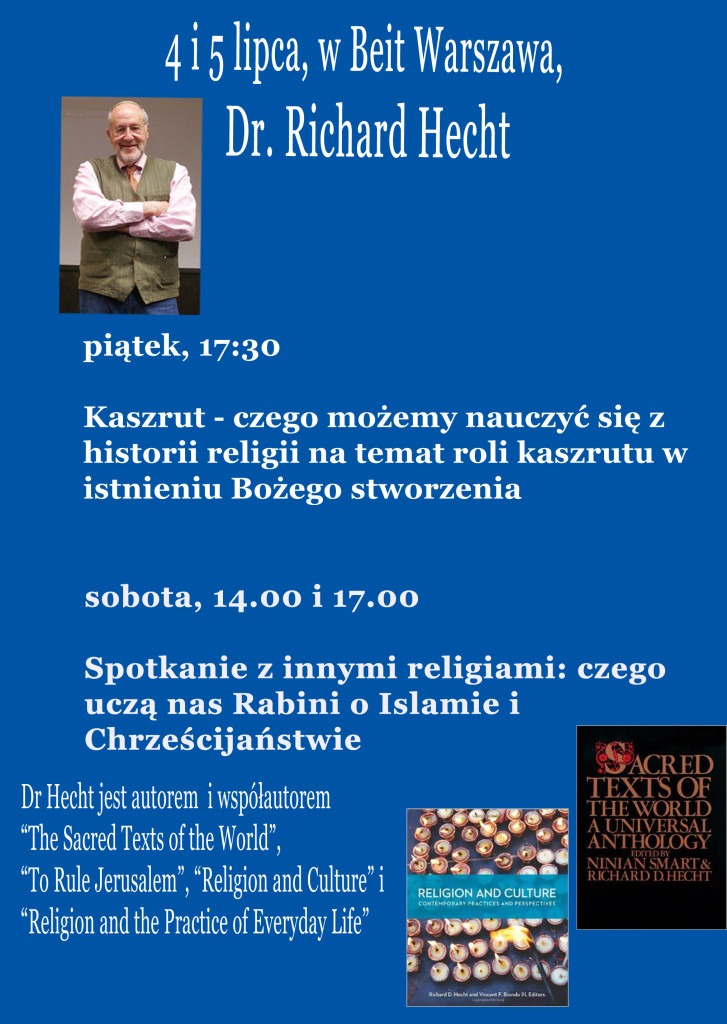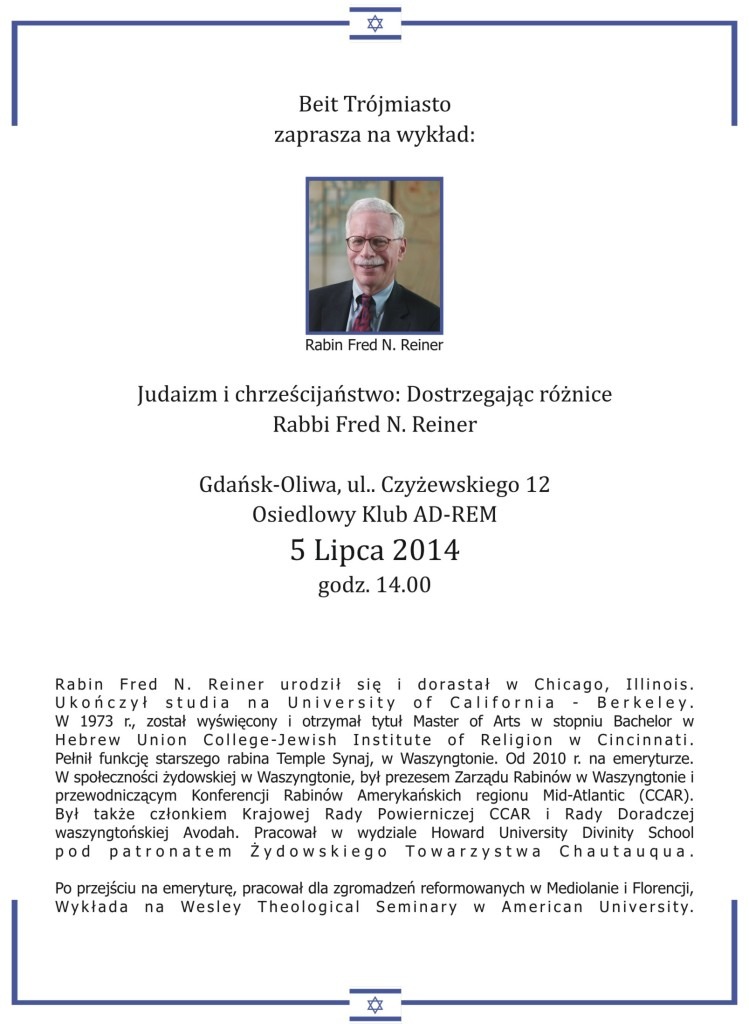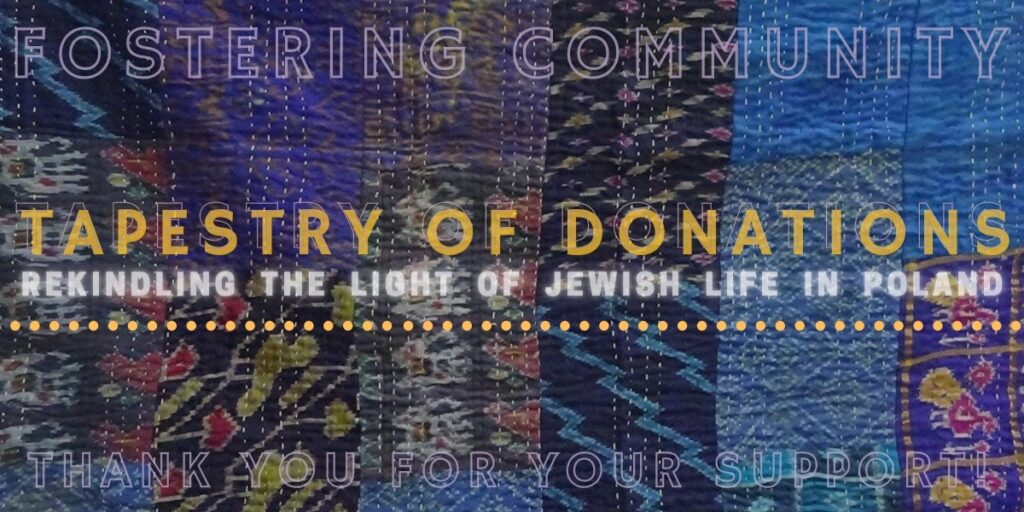During the 4th of July weekend in Poland two distinguished scholars spoke to Beit Polska congregations. Rabbi Fred Reiner taught in Beit Trojmiasto (Gdansk, Sopot and Gydinia). Dr. Richard Hecht taught at Beit Warszawa.
Here is a snippet of visiting scholar, Dr. Richard Hecht’s lecture called The Bible’s Practice of Keeping Kosher – The Food You Eat and the Maintenance of Creation – What Can History of Religions Teach Us?
Rabbi Fred Reiner July 4, 2014 Beit Trojmiasto
Judaism’s unique approach to other faiths “Where Judaism and Christianity Diverged: Differences of Belief”
Rabbi Fred Reiner July 5, 2014 Beit Trojmiasto
Teaching about the history of the Jewish prayer book (Rabbi Reiner)
“What We Pray and What We Believe: How Theology Has Shaped Liturgical Changes in Progressive/Reform Judaism”
Fred N. Reiner served as Senior Rabbi of Temple Sinai, Washington, DC, from 1985 through June, 2010, and is now Rabbi Emeritus. During his tenure the congregation doubled in size to nearly 1200 households, added a nursery school, expanded its religious school, enlarged its building, and enriched its ritual, educational, and programmatic offerings. Rabbi Reiner has been president of the Washington Board of Rabbis and president of the Mid-Atlantic region of the Central Conference of American Rabbis (CCAR). He also served on the Board of Trustees of the national CCAR and on the Washington Advisory Council of Avodah. He has taught at Howard University Divinity School and is an adjunct faculty member at Wesley Theological Seminary.He has provided leadership nationally and in the Washington area on issues such as reproductive rights, church-state separation, housing, D.C. voting rights, and aging concerns. He has published articles in both academic and popular journals.A native of Chicago, Rabbi Reiner received his B.A. degree from the University of California-Berkeley, where he was a campus leader following Berkeley’s Free Speech Movement. In 1973, he was ordained and received a M.A. in Hebrew Letters degree from the Hebrew Union College-Jewish Institute of Religion in Cincinnati (HUC-JIR). Since ordination, Rabbi Reiner has served as Director of Admissions at Hebrew Union College and in pulpits in Topeka, Kansas, and the Chicago area.His son, David, was ordained as a rabbi in 2009 and serves Temple Shearith Israel in Ridgefield, Connecticut. His wife, Dr. Sherry Levy-Reiner, died in 2013.
 July 4, 2014 at Beit Warszawa at 5:30, Dr. Richard Hecht
July 4, 2014 at Beit Warszawa at 5:30, Dr. Richard Hecht“The Bible’s Practice of Keeping Kosher – The Food You Eat and the Maintenance of Creation- What Can History of Religions Teach Us?”Leviticus 11 and Deuteronomy Deuteronomy 14 provide the dietary restrictions of ancient Israel. But how might these restrictions be understood? Was the Mosaic dietary system intended to provide what we might think of as public health regulations? Were they intended to mark differences and set boundaries for identity that would distinguish the Israelites from their neighbors? Were they intended to cultivate public and individual virtues? Here we will argue that laws of kashrut were intended to maintain the divinely created order of the cosmos, so that God and Israel were linked in the sustenance of order. Reasons for keeping kosher from a history of religion standpoint (Dr. Hecht)
Saturday (Shabbat) on July 5, 2014, Dr. Richard Hecht 2 pm and 5 pm
Subject of the seminar: The Challenges of Other Religions – What do the Rabbis Say about Islam and Christianity?
First Unit (2 pm) —The Torah contains many commandments and proscriptions against non-Israelite deities and their followers and rituals. By the first century BCE, the relationships between Jews and Greco-Romans had become complicated by the political history of Judea. Two fundamental questions arose. First, if the first man and first woman had walked in the garden with the One God, how was it possible that other deities and religious traditions arose? Second, what relationships were deemed appropriate in the complicated world of the Roman Empire, where Jews, both in the land and outside it, might interact with the followers of these deities in ways that the Israelites could not have imagined. This unit will focus on several chapters from the Mishnah’s Tractate Avodah Zarah (“Strange” or “Foreign Worship”) which will be read and translated in Hebrew, Polish, and English.
Second Unit (5 pm) — Tractate Avodah Zarah set forth the halakhic relationships between Jewish religious life and the religious traditions of the non-Jewish world. The conversion of Constantine to Christianity in the 4th century changed these relationships in significant ways. The idolatrous religions which were addressed in idea and halakhot of Avodah Zarah were marginalized by the new state religion, Christianity. Later of course, Islam would also join the complicated and dense religious cultures of the mediterranean world. Did the varieties of Christianity and Islam that Jews confronted in the Middle Ages fall under these halakhic relationships? This unit will focus on several chapters from the Rambam’s Hilchot Avodat Kochavim which will be read and translated in Hebrew, Polish and English.
Richard Hecht is Professor of Religious Studies at UCSB where he has taught since 1974. He has had several administrative positions over the nearly four decades of his career, including the chair of his department, director of the University of California’s Education Abroad Study Center at the Hebrew of Jerusalem, Associate Director for Academic Affairs in the University Office of the Education Abroad Program, and Chair of the University of California Press’ Faculty Editorial Board.
His research has been spanned Hellenistic Judaism, religion and politics, and religion and contemporary art. His teaching covers the fields of Judaism and religion and culture. Among his most popular courses are a course on the religion and politics of Jerusalem, a course religion and film, a course on the impact on the impact of the Vietnam war on American religion and culture, a course he teaches on religion and science with a physicist and a historian, and a survey course on the history of Judaism from the sixteenth century to the present.
He is the author of four books: The Sacred Texts of the World with Ninian Smart which has been in print since 1982 and is used in dozens of world religion courses around the world, To Rule Jerusalem with his colleague Roger Friedland, Religion and the Practice of Everyday Life and Religion and Culture, both with his former student, Professor Vincent Biondo. He is completing a book on the politics of sacred places, of course taking up Jewish, Christian and Muslim sites in Jerusalem, but also other places that might not initially appear to be religious, such as the US Vietnam Veterans Memorial in Washington, D.C. and how artists like Anselm Kiefer or Sophie Calle use space in their work.



Leave a Reply